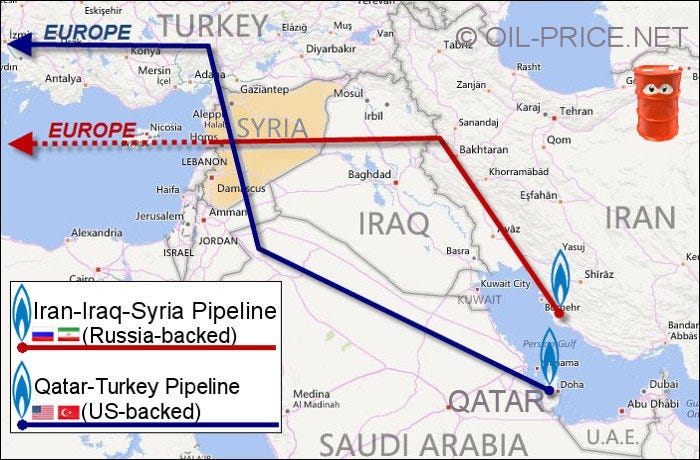The Great Gas Grab: How Resources Fuel Middle Eastern Conflicts
Gas, pipelines, power: Trump's first term alredy unveiled Syria's resource wars, where energy becomes a global weapon: a critical lens into current geopolitical manipulation.
Gas, geopolitics, and ambition: the Syrian conflict offers a stark window into how energy resources drive global power struggles. Since Trump's first term, the battle for dominance over pipelines and gas reserves has escalated, turning energy into a weapon in a ruthless geopolitical game. Understanding these dynamics requires a step back to connect the dots of recent history, where economic interests often outweigh ideological clashes.
At its core, Syria’s turmoil is less about political disputes and more about the primal quest for energy control. The global race for natural gas has nations and corporations maneuvering like players in a high-stakes chess match, with human lives caught in the crossfire. Central to this story are the world’s largest gas holders: Russia, Iran, and Qatar. Their immense reserves set the stage for a fierce international drama where energy represents power—and power determines survival.
But Russia, Iran, and Qatar are not alone, in this complicated scenario we can’t miss (let’s say “of course”) the United States, and Israel—each with their hands deep in a pot of potential gas wealth, particularly in the Levant Basin Province. In 2010, the U.S. Geological Survey revealed a staggering 122 trillion cubic feet of undiscovered recoverable natural gas in this region spanning Syria, Lebanon, and Palestine.
The historical context is crucial. Iran's relationship with Western powers is a tale of exploitation and resistance. British and American intelligence services orchestrated a coup in 1953 after Iran's democratically elected prime minister nationalized the country's oil resources. They installed the Shah, who became a compliant weapon buyer and resource distributor for Western interests. The 1979 Iranian Revolution dramatically reversed this arrangement, expelling foreign powers and reclaiming national resources.
The initial play in Syria was simple: Qatar, a U.S. ally, wanted to build a pipeline through Syria to Turkey, offering Europe an alternative to Russian gas. Russia supplies up to 80% of gas for countries like Austria, a dependency the West desperately wants to break. But Syria's President Bashar al-Assad said no—and that refusal became a death sentence for his country.
There are many articles in the “mainstream media” that rejected this version in 2016, but now it seems even more obvious that the correct version of History may instead be just that.
According to Robert F. Kennedy Jr. (yes, that RFK), secret cables from U.S., Saudi, and Israeli intelligence agencies show that the moment Assad rejected the Qatari pipeline, military planners decided to foment a Sunni uprising. The CIA began funding opposition groups—well before the Arab Spring—partnering with Qatar and Turkey, who supported terrorist groups like al-Nusra (essentially Al-Qaeda rebranded) to overthrow Assad.
Israel's role is particularly cynical. They've consistently bombed Syria, preventing gas exploration, and have even treated Syrian rebel fighters—including al-Qaeda proxies—in their hospitals. The former head of Israeli intelligence brazenly admitted to these tactical maneuvers, suggesting a calculated approach to regional destabilization.
The sanctions are another weapon of economic warfare. Trump's Caesar Act effectively blocked any foreign company from cooperating with Syria, strangling its ability to extract and sell gas. When Trump withdrew troops from Syria, he strategically repositioned them near oil fields, depriving Syria of crucial revenue—approximately a quarter of its government's income.
Iran faces similar tactics. The nuclear deal, which Iran meticulously followed according to international inspectors, was sabotaged to keep Iran isolated and unable to sell its gas. Israel, ironically the region's only nuclear-armed state, opposes the deal not out of security concerns, but to prevent Iran from entering global energy markets.
Lebanon finds itself in a similar predicament. Israel has sent a massive ship to the disputed maritime border, essentially attempting to grab gas fields before any agreement is reached. Hezbollah has warned this could trigger war, highlighting the volatility of resource competition.
The endgame? European energy diversification. EU Commissioner Ursula von der Leyen explicitly stated the desire to replace Russian gas with supplies from Israel and Egypt, positioning these countries as "trustworthy" alternatives. The Jerusalem Post even ran a headline declaring "Israel will help free EU from depending on Russian energy"—a bold statement that reveals the true motivations behind geopolitical maneuvering.
The human cost was staggering. Millions displaced, infrastructure destroyed, and populations suffering—all to reroute gas supplies and undermine Russian economic influence. The victims are always everyday people paying higher prices for gas, food, and basic necessities.
This isn't just about energy—it's about power. A select group of elites manipulate geopolitical tensions, destroying countries, and displacing populations to control resource flows and maintain global economic hierarchies. The Palestinians, like many indigenous populations before them, are rendered invisible in this calculus of power.
The tragedy is that most people remain oblivious to these machinations, seeing conflicts as ideological struggles rather than what they truly are: calculated resource wars conducted with breathtaking cynicism. Nations will kill, displace, and destabilize entire regions to ensure control over energy resources and maintain their economic dominance.
In this game of global chess, human lives are mere pawns, sacrificed without hesitation on the altar of geopolitical ambition and resource control.
This article is loosely based on the commendable work of Richard Medhurstan, a Syrian-born independent journalist living and working in the United Kingdom whose work focuses on U.S. politics, international relations, and the Middle East. for those interested in the details can see it here:









Great article.
Yes, geopolitics is a very ugly, stomach-turning business once you look behind the thin veneer of great-sounding PR messages.
That said, with the likelihood of a gas pipeline from Qatar to Europe now much higher, this should make investing in Qatar's gas companies or Qatar ETFs an interesting long-term investment.
So the empire and its genocidal strategic alliance is all about the money. Who would have thought?
And mean while, depose leftist Bolivian democracy to allow Musk to control lithium fields and continue to sabotage Venezuela’s leftist government. Has not worked and the indigenous pay the price